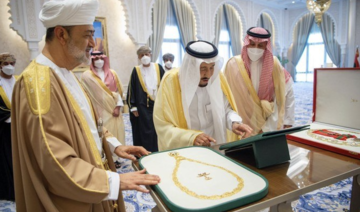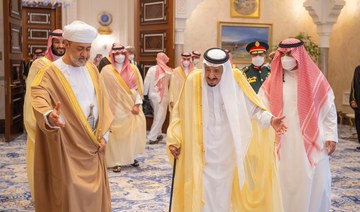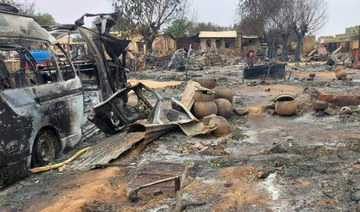RIYADH: Saudi Arabia's King Salman received a phone call on Saturday from the president of Turkey.
President Recep Tayyip Erdogan congratulated the king on the approaching Eid Al-Adha festival.
King Salman reciprocated, "praying to God to restore this occasion to all Muslims with goodness and joys," the Saudi Press Agency (SPA) reported.
During the call, the two leaders reviewed the relations between their countries were reviewed, SPA said.
King Salman receives Eid greetings from Turkish leader
https://arab.news/bp8pj
King Salman receives Eid greetings from Turkish leader
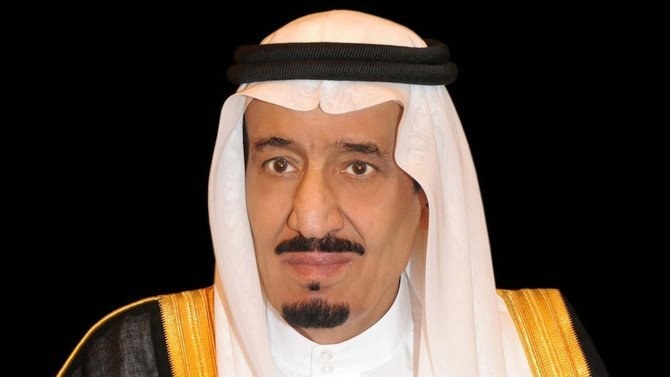
Japan beats Uzbekistan in stoppage time in U23 Asian Cup final

- Substitute Fuki Yamada broke the deadlock in the first minute of stoppage time
AL-RAYYAN, Qatar: Japan left it late to win its second Under-23 Asian Cup after beating Uzbekistan 1-0 in the final on Friday.
Substitute Fuki Yamada broke the deadlock in the first minute of stoppage time at Jassim bin Hamad Stadium and Japan goalkeeper Leo Kokubo saved a penalty to preserve the lead.
Uzbekistan, the 2018 champion, almost took an incredible lead just before halftime. Ruslanbek Jiyanov, just inside the Japanese half, tried to send a long cross into the area but, instead, the flight of the ball deceived Kokubo and bounced off the crossbar.
For the goal, Ryotaro Araki backheeled the ball to Yamada just outside the area, and he fired low into the left corner.
Just five minutes later, Uzbekistan was awarded a penalty after a VAR review when Hiroki Sekine handled in the area. Kokubo made a diving save to his right to push out Umarali Rakhmonaliev’s powerful shot.
Both finalists and third-placed Iran also qualified for Paris Olympics men’s football. Fourth-placed Indonesia has one more chance to make it to a first Olympics since 1956 with a playoff against Guinea next Thursday.
UN official warns famine in northern Gaza is already ‘full-blown’
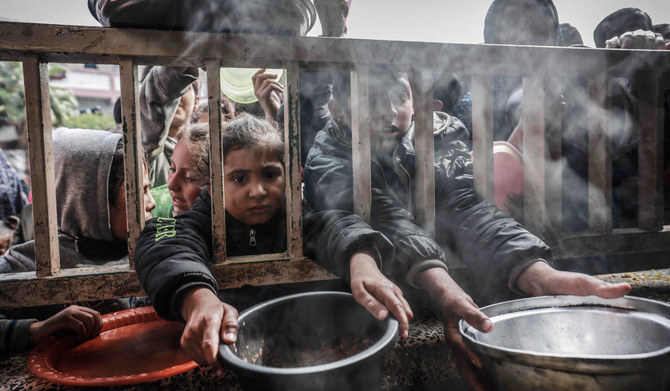
- Israel has killed more than 34,000 Palestinians since Oct. 7 attacks by Hamas
- There was no immediate comment from Israel, which controls entrance into Gaza
WASHINGTON: A top UN official said Friday that hard-hit northern Gaza was now in “full-blown famine” after more than six months of war between Israel and Hamas and severe Israeli restrictions on food deliveries to the Palestinian territory.
Cindy McCain, the American director of the UN World Food Program, became the most prominent international official so far to declare that trapped civilians in the most cut-off part of Gaza had gone over the brink into famine.
“It’s horror,” McCain told NBC’s “Meet the Press” in an interview to air Sunday. “There is famine — full-blown famine — in the north, and it’s moving its way south.”
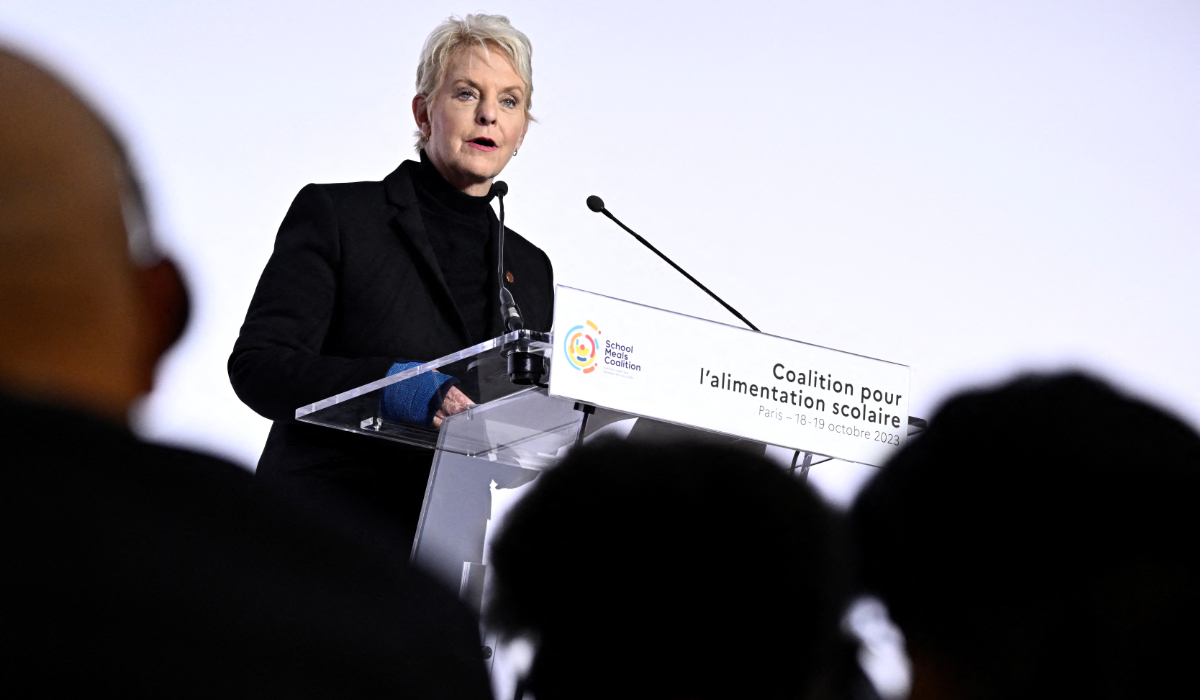
She said a ceasefire and a greatly increased flow of aid through land and sea routes was essential to confronting the growing humanitarian catastrophe in Gaza, home to 2.3 million people.
There was no immediate comment from Israel, which controls entrance into Gaza and says it is beginning to allow in more food and other humanitarian aid through land crossings.
The panel that serves as the internationally recognized monitor for food crises said earlier this year that northern Gaza was on the brink of famine and likely to experience it this month. The next update will not come before this summer.
One of the US Agency for International Development’s humanitarian officials in Gaza told The Associated Press that on-the-ground preparations for a new US-led sea route were on track to bring in more food — including treatment for hundreds of thousands of starving children — by early or mid-May. That’s when the American military expects to finish building a floating pier to receive the shipments.
Ramping up the delivery of aid on the planned US-backed sea route will be gradual as aid groups test the distribution and security arrangements for relief workers, the USAID official said.
The official spoke on condition of anonymity over security concerns for work done in a conflict zone. They were some of the agency’s first comments on the status of preparations for the Biden administration’s $320 million Gaza pier project, for which USAID is helping coordinate on-the-ground security and distribution.
At a factory in rural Georgia on Friday, USAID Administrator Samantha Power pointed to the food crises in Gaza and other parts of the world as she announced a $200 million investment aimed at increasing production of emergency nutritional paste for starving children under 5.
Power spoke to factory workers, peanut farmers and local dignitaries sitting among pallets of the paste at the Mana nonprofit in Fitzgerald. It is one of two factories in the US that produces the nutritional food, which is used in clinical settings and made from ground peanuts, powdered milk, sugar and oil, ready to eat in plastic pouches resembling large ketchup packets.
“This effort, this vision meets the moment,” Power said. “And it could not be more timely, more necessary or more important.”
Under pressure from the US and others, Israeli officials in recent weeks have begun slowly reopening some border crossings for relief shipments.
But aid coming through the sea route, once it’s operational, still will serve only a fraction — half a million people — of those who need help in Gaza. Aid organizations including USAID stress that getting more aid through border crossings is essential to staving off famine.
Children under 5 are among the first to die when wars, droughts or other disasters curtail food. Hospital officials in northern Gaza reported the first deaths from hunger in early March and said most of the dead were children.
Power said the UN has called for 400 metric tons of the nutritional paste “in light of the severe hunger that is pervading across Gaza right now, and the severe, acute humanitarian crisis.” USAID expects to provide a quarter of that, she said.
Globally, she said at the Georgia factory, the treatment made there “will save untold lives, millions of lives.”
USAID is coordinating with the World Food Program and other humanitarian partners and governments on security and distribution for the pier project, while US military forces finish building it. President Joe Biden, under pressure to do more to ease the humanitarian catastrophe in Gaza as the US provides military support for Israel, announced the project in early March.
US Central Command said in a statement Friday that offshore assembly of the floating pier has been temporarily paused due to high winds and sea swells, which caused unsafe conditions for soldiers. The partially built pier and the military vessels involved have gone to Israel’s Port of Ashdod, where the work will continue.
A US official said the high seas will delay the installation for several days, possibly until later next week. The official, who spoke on condition of anonymity to discuss operation details, said the pause could last longer if the bad weather continues because military personnel and divers have to get into the water for the final installation.
The struggles this week with the first aid delivery through a newly reopened land corridor into north Gaza underscored the uncertainty about security and the danger still facing relief workers. Israeli settlers blocked the convoy before it crossed Wednesday. Once inside Gaza, the convoy was commandeered by Hamas militants, before UN officials reclaimed it.
In Gaza, the nutritional treatment for starving children is most urgently needed in the northern part of the Palestinian territory. Civilians have been cut off from most aid supplies, bombarded by Israeli airstrikes and driven into hiding by fighting.
Acute malnutrition rates there among children under 5 have surged from 1 percent before the war to 30 percent five months later, the USAID official said. The official called it the fastest such climb in hunger in recent history, more than in grave conflicts and food shortages in Somalia or South Sudan.
One of the few medical facilities still operating in northern Gaza, Kamal Adwan hospital, is besieged by parents bringing in thousands of children with malnutrition for treatment, the official said. Aid officials believe many more starving children remain unseen and in need, with families unable to bring them through fighting and checkpoints for care.
Saving the gravely malnourished children in particular requires both greatly increased deliveries of aid and sustained calm in fighting, the official said, so that aid workers can set up treatment facilities around the territory and families can safely bring children in for the sustained treatment needed.
Canada arrests three Indians over killing of Sikh activist
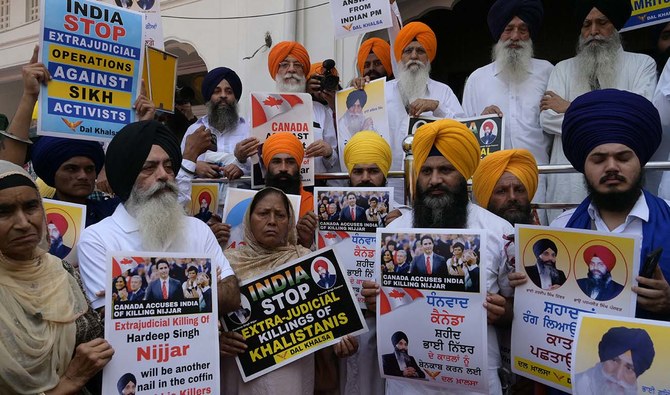
- The murder of Hardeep Singh Nijjar plunged Canada, India into a serious diplomatic crisis last fall
- Nijjar, who immigrated to Canada in 1997, advocated for a separate Sikh state, known as Khalistan
VANCOUVER: Canadian police on Friday arrested three men over the killing last year in Vancouver of a Sikh separatist, whose death has been linked to the Indian government.
The murder of Hardeep Singh Nijjar plunged Canada and India into a serious diplomatic crisis last fall after Prime Minister Justin Trudeau suggested Indian government involvement in the homicide.
India dismissed the allegations as “absurd” and responded furiously, briefly curbing visas for Canadians and forcing Ottawa to withdraw diplomats.
Three Indian nationals, two aged 22 and one aged 28, were arrested Friday and charged with first degree murder and conspiracy charges. They are accused of being the shooter, driver and lookout on the day Nijjar was killed.
They were arrested by police in Edmonton, in the neighboring province of Alberta, where they reside, and are being held pending further proceedings.
All had been in Canada for between three and five years, police said at a news conference.
“This investigation does not end here. We are aware that others may have played a role in this homicide,” said Mandeep Mooker of the Royal Canadian Mounted Police’s homicide investigations team.
Nijjar — who immigrated to Canada in 1997 and became a citizen in 2015 — advocated for a separate Sikh state, known as Khalistan, carved out of India.
He was wanted by Indian authorities for alleged terrorism and conspiracy to commit murder.
On June 18, 2023, he was shot dead by masked assailants in the parking lot of the Sikh temple he led in suburban Vancouver.
Trudeau announced several months later that Canada had “credible allegations” linking Indian intelligence to the killing and expelled an Indian official, spurring the diplomatic tit-for-tat with New Delhi.
Mooker said Canadian police are still investigating the ties of the suspects, “if any, to the Indian government.”
“It is a bit of a sigh of relief that the investigation is moving forward,” Moninder Singh, a close friend of Nijjar, told AFP.
“It is ultimately India who is responsible and hiring individuals to assassinate Sikh leaders in foreign countries,” said Singh, spokesperson for the British Columbia Council of Gurdwaras.
In November, the US Justice Department charged an Indian citizen living in the Czech Republic with allegedly plotting a similar assassination attempt on American soil.
Prosecutors said in unsealed court documents that an Indian government official was also involved in the planning.
The shock allegations came after US President Joe Biden hosted Indian Prime Minister Narendra Modi for a rare state visit, as Washington seeks closer ties with India against China’s growing influence.
US intelligence agencies have assessed that the plot on American soil was approved by India’s top spy official at the time, Samant Goel, The Washington Post reported this week.
Canada is home to some 770,000 Sikhs, who make up about two percent of the country’s population, with a vocal minority calling for an independent state of Khalistan.
The UN warns Sudan’s warring parties that Darfur risks starvation and death if aid is not allowed in
The UN warns Sudan’s warring parties that Darfur risks starvation and death if aid is not allowed in
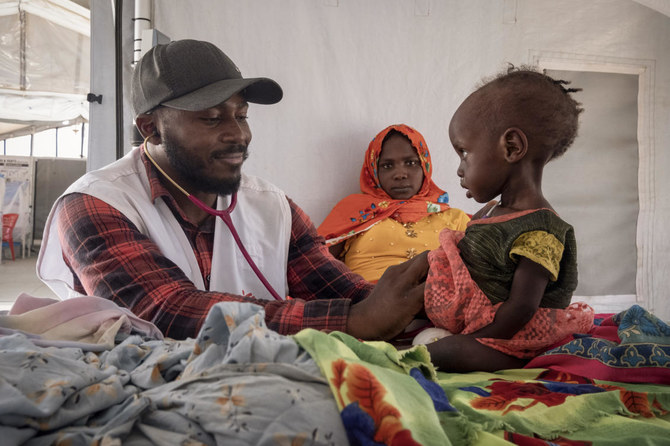
- At least 1.7 million people in Darfur were experiencing emergency levels of hunger in December
- Sudan plunged into chaos in mid-April 2023, when long-simmering tensions between the military and the paramilitary forces broke out into street battles
UNITED NATIONS: The United Nations food agency warned Sudan’s warring parties Friday that there is a serious risk of widespread starvation and death in Darfur and elsewhere in Sudan if they don’t allow humanitarian aid into the vast western region.
Leni Kinzli, the World Food Programme’s regional spokesperson, said at least 1.7 million people in Darfur were experiencing emergency levels of hunger in December, and the number “is expected to be much higher today.”
“Our calls for humanitarian access to conflict hotspots in Sudan have never been more critical,” she told a virtual UN press conference from Nairobi.
Sudan plunged into chaos in mid-April 2023, when long-simmering tensions between its military led by Gen. Abdel Fattah Burhan, and the paramilitary Rapid Support Forces commanded by Mohammed Hamdan Dagalo, broke out into street battles in the capital, Khartoum. Fighting has spread to other parts of the country, especially urban areas and the Darfur region.
The paramilitary forces, known as the RSF, have gained control of most of Darfur and are besieging El Fasher, the only capital in Darfur they don’t hold, where some 500,000 civilians had taken refuge.
Kinzli said WFP’s partners on the ground report that the situation in El Fasher is “extremely dire” and it’s difficult for civilians wanting to flee the reported RSF bombings and shelling to leave.
She said the violence in El Fasher and surrounding North Darfur is exacerbating the critical humanitarian needs in the entire Darfur region, where crop production for staple cereals like wheat, sorghum and millet is 78 percent less than the five-year average.
On top of the impact of escalating violence, Kinzli said, “WFP is concerned that hunger will increase dramatically as the lean season between harvests sets in and people run out of food.” She said a farmer in El Fasher recently told her that her family had already run out of food stocks and is living day-to-day, an indication that the “lean season,” which usually starts in May, started earlier.
Kinzli said she received photos earlier Friday from colleagues on the ground of severely malnourished children in a camp for displaced people in Central Darfur, as well as older people “who have nothing left but skin and bones.”
“Recent reports from our partners indicate that 20 children have died in recent weeks of malnutrition in that IDP camp,” she said.
“People are resorting to consuming grass and peanut shells,” Kinzli said. “And if assistance doesn’t reach them soon, we risk witnessing widespread starvation and death in Darfur and across other conflict-affected areas in Sudan.”
Kinzli called for “a concerted diplomatic effort by the international community to push the warring parties to provide access and safety guarantees” for humanitarian staff and convoys.
“One year of this devastating conflict in Sudan has created an unprecedented hunger catastrophe and threatens to ignite the world’s largest hunger crisis,” she warned. “With almost 28 million people facing food insecurity across Sudan, South Sudan and Chad, the conflict is spilling over and exacerbating the challenges that we’ve already been facing over the last year.”
In March, Sudanese authorities revoked WFP’s permission to deliver aid from neighboring Chad to West Darfur and Central Darfur from the town of Adre, saying that crossing had been used to transfer weapons to the RSF. Kinzli said restrictions from Sudanese authorities in Port Sudan are also preventing WFP from transporting aid via Adre.
Sudanese authorities approved the delivery of aid from the Chadian town of Tina to North Darfur, but Kinzli said WFP can no longer use that route for security reasons because it goes directly into besieged El Fasher.
On Thursday, gunmen in South Darfur killed two drivers for the International Committee of the Red Cross and injured three ICRC staff members. On Friday, UN humanitarian chief Martin Griffith called the killing of aid works “unconscionable.”
Kinzli said the fighting “and endless bureaucratic hurdles” have prevented WFP from delivering aid to over 700,000 people in Darfur ahead of the rainy season when many roads become impassable.
“WFP currently has 8,000 tons of food supplies ready to move in Chad, ready to transport, but is unable to do so because of these constraints,” she said.
“WFP urgently requires unrestricted access and security guarantees to deliver assistance,” she said. “And we must be able to use the Adre border crossing, and move assistance across front lines from Port Sudan in the east to Darfur so we can reach people in this desperate region.”
Saleem Haider Khan, Faisal Kundi named governors of Pakistan’s Punjab, Khyber Pakhtunkhwa provinces

- Nominations come as part of power-sharing deal between PM Sharif’s party and ex-FM Bhutto-Zardari-led faction
- According to the deal, the PPP backed Sharif for the prime minister’s office in return for constitutional positions
ISLAMABAD: The Pakistan Peoples Party (PPP), a coalition partner in Prime Minister Shehbaz Sharif’s government, has nominated Saleem Haider Khan and Faisal Karim Kundi as governors of Pakistan’s eastern Punjab and northwestern Khyber Pakhtunkhwa provinces, the PPP chairman announced on Friday.
The PPP forged an alliance with PM Sharif’s Pakistan Muslim League-Nawaz (PML-N) party after Pakistan’s national election on February 8 failed to present a clear winner.
According to the power-sharing deal, the PPP backed Sharif for the prime minister’s office in return for the presidency, chairman of Senate and other important constitutional positions.
In a post on X, PPP Chairman Bilawal Bhutto-Zardari congratulated Khan and Kundi, and extended his good wishes to them
“I am confident they [Khan and Kundi] will perform their duties with the dignity their new office demands,” he said on X.
In Pakistan, a governor is a representative of the state to a province, who is appointed by the president on the advice of the prime minister.
Such positions may seem ceremonial and symbolic, but they do hold significant constitutional importance.
At present, PML-N’s Balighur Rehman has been serving as the Punjab governor, while JUI-F’s Hajji Ghulam Ali holds the post in KP.
Bhutto-Zardari also called on PM Sharif in Islamabad, following the nominations, Pakistani state media reported.
“During the meeting, views were exchanged on overall political situation in the country and matters of national interest,” the Radio Pakistan broadcaster said.



